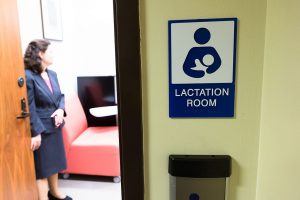 The new lactation accommodations bill of 2020 (SB 142) builds upon and expands the breastfeeding accommodations changes enacted in 2018 regarding lactation location requirements. Until now, Labor Code section 1030 required employers to provide a reasonable amount of break time to express milk. However, the new law specifies that the employer must provide a reasonable amount of break time “each time” the employee needs to express milk.
The new lactation accommodations bill of 2020 (SB 142) builds upon and expands the breastfeeding accommodations changes enacted in 2018 regarding lactation location requirements. Until now, Labor Code section 1030 required employers to provide a reasonable amount of break time to express milk. However, the new law specifies that the employer must provide a reasonable amount of break time “each time” the employee needs to express milk.
Further, while Labor Code section 1031 presently requires employers to “make reasonable efforts” to provide a location “other than bathroom”, this new law requires the employer to provide such a location (not simply make an effort), and specifically outlines a number of requirements of such a location, i.e. it has to be close to the employee’s work area, shielded from view for basic privacy, and free from intrusion while the employee is lactating. The lactation room must also be (1) safe, clean and free of hazardous materials; (2) contain a surface to place a breast pump and personal items; (3) contain a place to sit; and (4) have access to electricity or alternative devices (extension cords, charging stations, etc..) to operate and electric or battery operated breast pump.
Employers must also provide access to a sink with running water and a refrigerator (or similar cooling storage area) suitable for storing milk in close proximity to employee’s workplace. Where the lactation room is used for other purposes, the use of that room for lactation purposes shall take precedence over other uses during the period it is in use for lactation purposes.
Like with disability accommodations laws, labor code 1031 provides an undue hardship exemption to all employers, provided they meet the standards identified. The SB 142 limits availability of undue hardship standard to employers with 50 or fewer employees, where those smaller employers would be able to demonstrate that any of the lactation accommodations would impose an undue hardship by causing the employer significant expense or operational difficulty when considered in relation to the size, financial resources, and the nature of structure of the employer’s business.
The new law also adds retaliation protection for employees who request lactation accommodations. Thus, demoting or otherwise disciplining, or terminating and employee for requesting a lactation accommodation would form a basis for a wrongful termination claim against that employer.
Please review California Labor Code section 1030 through 1034 for more information on lactation accommodations requirements at workplace.